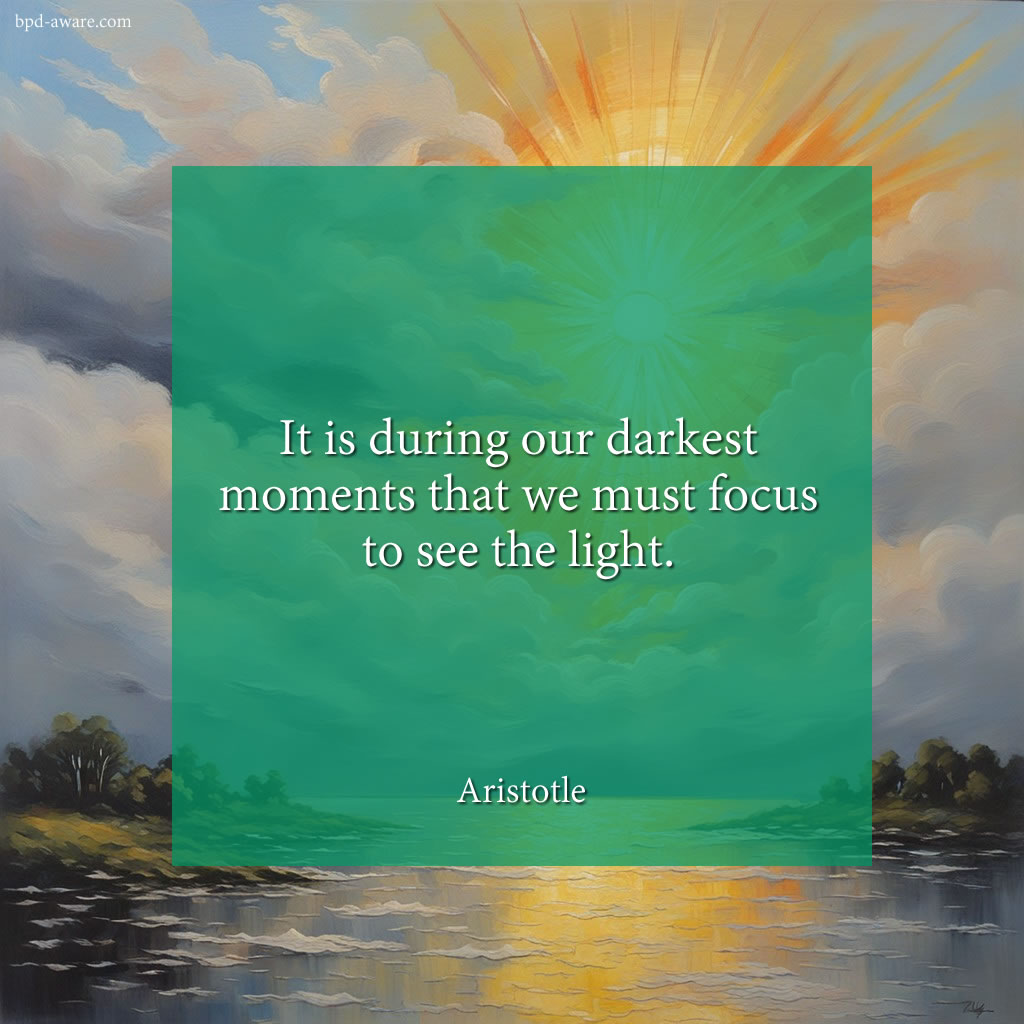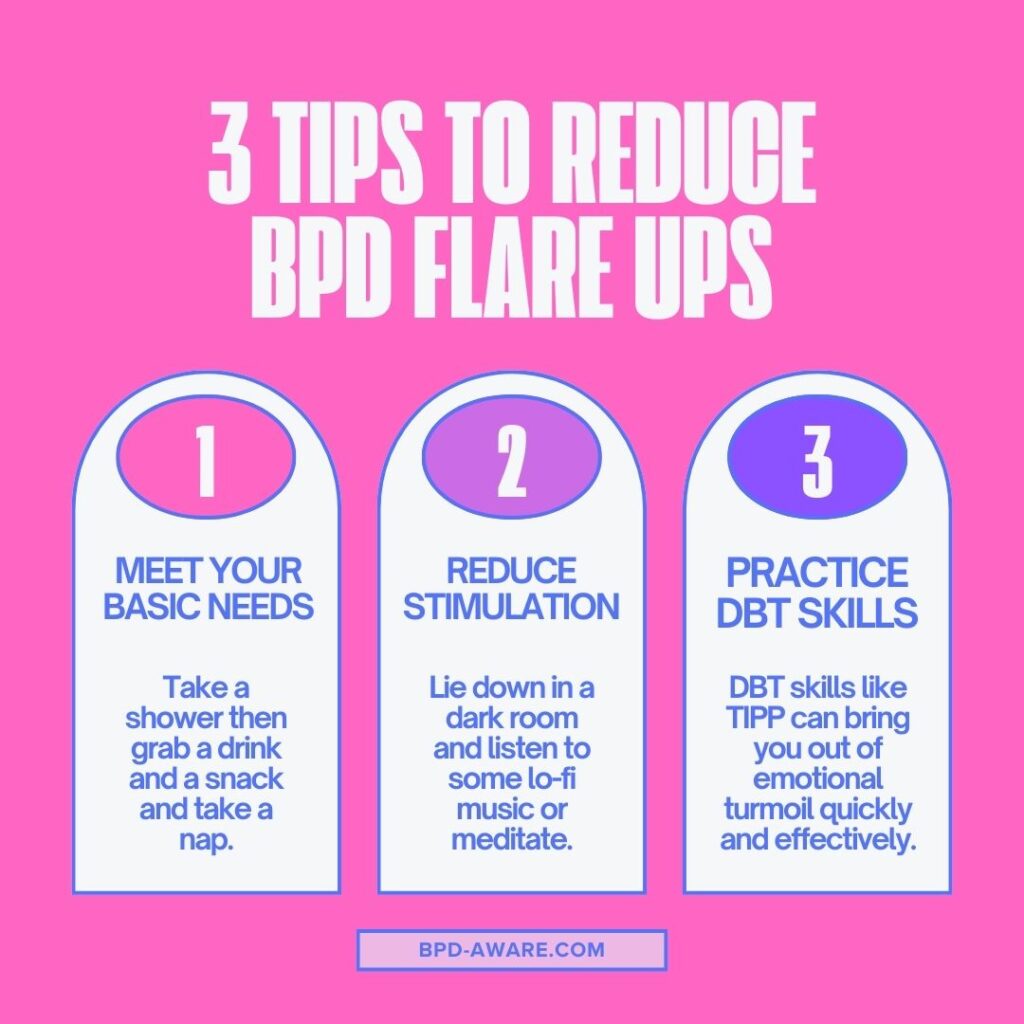When you feel the symptoms of your borderline personality disorder flaring up inside of you, it can feel like the end of the world. With all those horrid thoughts and feelings whirling around in your mind, it can be next to impossible to function.
Having a few systems in place for when your BPD is flaring up can help you cope better with the symptoms – and hopefully minimize the negative effects of the episode as well as reduce the length of time it takes to pass.
Ask yourself if your basic needs have been met
Are you hungry? Grab something to eat, preferably something nutritious. Thirsty? Down a glass of water. Are you tired? Take a nap or have an early night. Feeling gross? Take a nice long shower or soak in the bath. Even the healthiest mind can struggle when its most basic needs aren’t being met.
Of course, sometimes, especially during a particularly bad episode, these actions can be easier said than done. That’s why it’s important to give yourself easy options at all times.
For example, having a few jars of homemade vegetable soup ready to go in the freezer to dip into when you’re feeling low can make things much easier than having to cook something from scratch or go out for something to eat. While healthier is always better, any food is better than nothing. If you only have junk on hand or have to order out then that’s better than not eating. Your body and mind need calories to properly function.
If you need to sleep but are struggling, a small dose of melatonin can help you drift off to sleep. They come in a range of strengths from 1mg to 10mg but it’s recommended to start with a low dose of 1mg and see how you get on with that. Melatonin is a hormone that we naturally produce that helps send us to sleep but, as with other hormones, sometimes their production can become dis-regulated. Having a melatonin pill can help you get to sleep and regulate your sleep pattern again.
Keeping proper hygiene can be trickier when you’re struggling as it’s harder to take short cuts but some people with BPD like to keep a bottle of mouthwash (and a glass) and wet wipes on their bedside table so they can at least feel a little cleaner when they’re having difficulty taking care of themselves.
There are times when you can be so overwrought that you’re not even aware that your basic needs aren’t being met. If you feel your mental health diminishing it can be a good idea to make a habit of having a glass of water and a snack, followed by a soak in the tub and then an early night. Sometimes that level of self-care can be enough to get you back on track.
Reduce stimulation
We live in an increasingly busy world that demands a lot of attention from us a lot of the time. Healthy relaxation has become a lost art form thanks to social media and that cold, little rectangle so many of us have in our hands whenever we have any downtime.
Most people in this day and age are overstimulated. When the mind is overstimulated it can enter the “flight or fight” response which ramps up the central nervous system – releasing hormones that cause anxiety. If the mind is continually overstimulated, it can lead to chronic fatigue and chronic stress.
When you consider that people with borderline personality disorder already have difficulty regulating their emotional responses, it’s easy to see why being in the “flight or fight” mode can be so disastrous to their mental well-being.
So if you’re beginning to feel the symptoms of your BPD flaring up, it can be extremely beneficial to give yourself some time to calm down and reduce the level of stimulation in your life. This does take a certain level of discipline as it can be difficult to put down your phone, turn off the TV, and relax for a while.
What I like to do when I’m feeling bad is to give myself a period of time (typically at least two evenings) where I significantly reduce the stimulation in my life. I love to take long baths with the lights off and a few scented candles flickering away. I leave my phone outside the bathroom and I don’t even bring in a book with me. I’ll just sit in the warm water and try to think of nothing at all. In many ways, it’s a form of meditation – which is a fantastic way to soothe an overstimulated mind. I’ll also go to bed very early and listen to some relaxing, lo-fi music with a warm drink (no caffeine!) and just close my eyes. If I drift off to sleep early, that suits me just fine when I’m trying to recover.
You want to be somewhere calm, quiet, and dimly lit where you can allow your mind to completely unwind from the stresses and strains of the world. It takes practice to “switch off” like this but it is deeply rewarding and helpful, especially for those with BPD.

Practice some DBT skills
Dialectical Behavioral Therapy is the psychotherapy with the highest proven success rate in treating Borderline Personality Disorder. When you undergo DBT, you will be taught many skills that can help a great deal with distress tolerance.
One of the ones I’ve found most useful when I feel myself entering a downward spiral is the TIPP skill (also known as TIP). These help by changing your body chemistry very quickly to reduce extreme emotion.
T – Temperature: Change the temperature of your body quickly by holding your breath and dunking your face in a large bowl of cold water. If you don’t have a large bowl then you could also take an ice pack and hold it against your face while bending over. Hold it for around 30 seconds and you’re done.
If you have a heart condition or take medication that slows your heart rate (such as beta blockers) you should consult with your healthcare provider before performing this skill as cold water will lower your heart rate.
I – Intense exercise: Engage in high-intensity exercise when you’re wound up by emotion. Any type of exercise is fine as long as it significantly raises your heart rate. For example, I like to run around the local park and complete one lap as quickly as I can. It’s about 1.5 miles and my heart is pounding by the time I finish and my head feels much clearer.
P – Paced breathing: Focus on the pace of your breathing by slowing it down and breathing from the belly. Try to slow it down to as little as five to six breaths per minute. Exhale more slowly than you inhale, for example, seven seconds breathing out and five seconds breathing in. You can do this for as long as you feel comfortable.
P – Progressive muscle relaxation: Lie down in a comfortable spot (such as on a yoga mat or your bed) and breathe slowly and deeply. Then focus on an area of your body such as your feet and tense them as hard as you can for five seconds (you can take longer if you wish). Then release the tension and exhale while saying the word “relax” in your mind. Move up your body from your feet to your legs, then your stomach, your arms, and finally your head.
We have more free DBT skills for you to learn and practice here: https://bpd-aware.com/tag/dbt-skills/

Final thoughts
Living with BPD is tough but with some forward thinking and being proactive, you can make it easier on yourself and those around you. You might also want to consider keeping a journal where you write about what’s happened to you every day as well as your thoughts and feelings. You may be able to spot certain patterns which cause flare-ups and thus be able to avoid them entirely or at the very least reduce them.
Do you have any tips of your own that have helped you cope when you’ve felt your BPD flaring up? We’d love to hear your tips in the comment form below!
Sources, Resources, and Further Reading
- If BPD Is Kicking Your Butt Today, Try These 8 Tips To Make It Through: https://themighty.com/topic/borderline-personality-disorder/coping-tips-borderline-personality-disorder/
- How I’ve Learned to Live with Borderline Personality Disorder: https://www.healthline.com/health/mental-health/its-not-easy-but-its-possible-how-ive-learned-to-live-with-borderline-personality-disorder
















